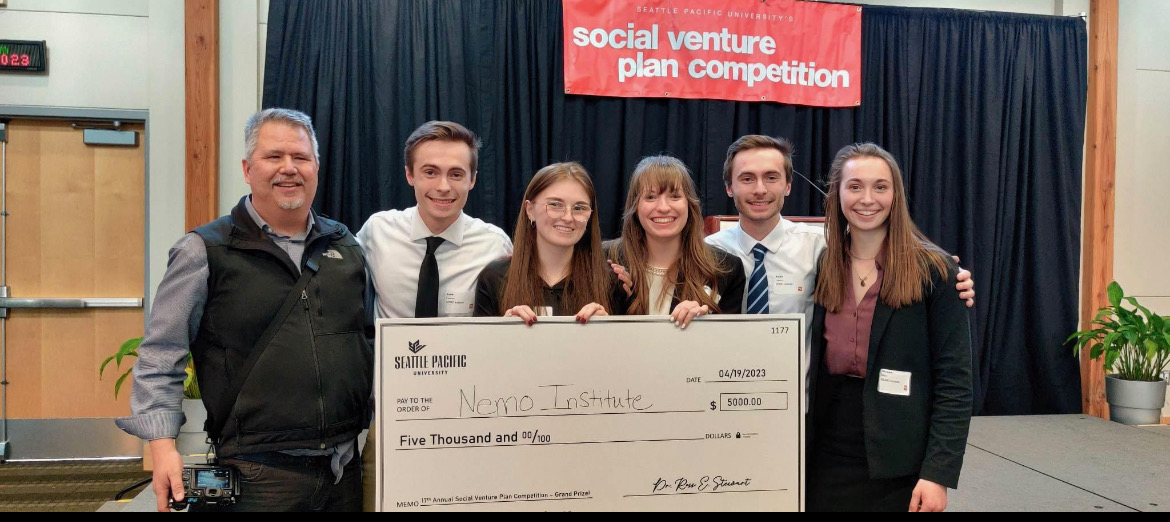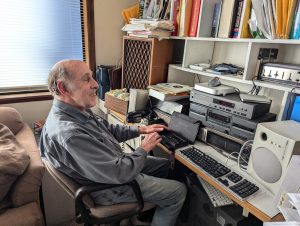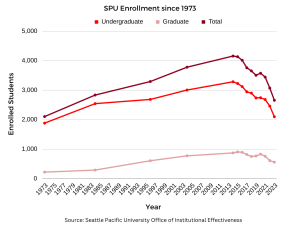Intelligence, innovation emerge at SPU’s Social Venture Plan competition
Thoughtful creations become reality as students present projects for funding awards
April 28, 2023

On April 19, 2023, innovation and savviness buzzed around Upper Gwinn at Seattle Pacific University during the 17th Annual Social Venture Plan. Students from all majors came together to tackle the world’s most pressing social needs. From education and generational stress to environmental reformation, students thought of it all.
A social venture plan is a way for students to showcase all skills and apply them to real-world issues. The groups competing are tasked with creating a solution to the problem of their choosing, ways of funding it and presenting the positive impact it will have on society.
One group delivered on all fronts, coming up with an effective solution to the rapidly depleting coral reefs. Senior business administration major and group member of The Nemo Institute, Austin Freeman, discussed how their team proposed using artificial coral made from terracotta alongside real coral to renew the reefs.
“When fish swim by and see the fake coral along with the real coral, they can’t tell the difference, they don’t care, they just want a habitat, somewhere to live,” Freeman said, “Fish give off nutrients that allow coral to grow, but if there’s no fish they can’t grow. So, we’re trying to bring fish back in by using this artificial coral.”
But this team was not the only impressive group in the competition.
Senior global development studies major Shelby Gladwell said that her group, Illumina, was determined to expose the exploitations of the fast fashion industry. They found many companies were “greenwashing” consumers. Illumina wanted to create a web browser extension to combat their efforts and expose the hard truths.
“Greenwashing is basically when a big corporation puts out these statements that they are environmentally friendly or that they do sustainable practices when in actuality, they are not and are merely capitalizing on a trend. It’s doing more harm to the environment than good,” Gladwell said.
While the results of these projects were wildly impressive, the journey leading up to the competition was filled with challenges, pushing groups to be flexible and adapt.
Junior business administration major and member of the Language of Learning group, Taylor Remigio, who was focused on increasing literacy proficiency in children through poetry, discussed a few of these hurdles.
“As a team, it can be hard to collaborate on ideas because people have different ideas. It’s hard to figure out one area. We struggled on coming up with a final product,” Remigio said. “At first we wanted to rewrite the curriculum, but it would have been hard to get the state board’s approval, so then we decided on the poetry kits.”
A junior from the University of Washington, Kalina Luong, competed in this year’s event and expressed her nervousness and excitement to present at a school unfamiliar to her and meet the other teams.
“In the beginning, I was so nervous. This is my first competition like this; it was scary to see how each interaction with a judge really mattered. I realized that it’s just meeting new people and talking about something I’m passionate about,” Luong said.
Despite her nervousness, the night went smoothly for her team. They and every other team at the event presented their project with confidence and precision.
As the final hours of the event came to a close, the judges flooded in from the adjacent room of Upper Gwinn, followed by parents, friends and students. They all found their way to the podium where the dean of the School of Business, Ross Stuart, stood to announce the winners. The air filled with anticipation and excitement as group members stood side by side next to their projects.
The People’s Choice Award, also known as the Dr. Don Summer’s Award, went to The Nemo Institute with a price of $1,000. Next were the three honorable mention awards, each with a prize of $2,000. The first recipient was CAT-friendly, whose goal is to prevent catalytic converter theft while improving the job market. The second was given to Guardian E-cycling, tasked with providing access to e-waste services to the Greater Seattle area. And finally, the last award went to Nomi, a group that designed a self-help robot whose main job is to help young professionals regulate their stress.
The second prize-winning group, which was awarded $3,000, was Water Harvesters. This group invented a “Fog Harp” designed to capture water from the moisture-rich fog in low-income areas of India and other parts of the world.
Last but certainly not least, the winner of the 2023 Social Venture Plan competition was announced. The Nemo Institute was awarded the title and a prize of $5,000, taking home a total of two awards and $6,000.
In response to their win, junior business administration major Hannah Miller said the team was delighted and thankful that the wait was over.
“I’m pretty excited. We were hoping to set out to change our small part of the world. We now have the support behind us to do that. A lot of us are thinking about doing this after we graduate, and it’s reaffirming to see that we have the support behind us,” Miller said.
The Social Venture Plan Competition is a great way for students to apply their knowledge and skill to the real world in a way that can easily come off the paper and into society. All groups poured their hearts into their projects and no doubt gained immeasurable experience and connections throughout the process.

























































































